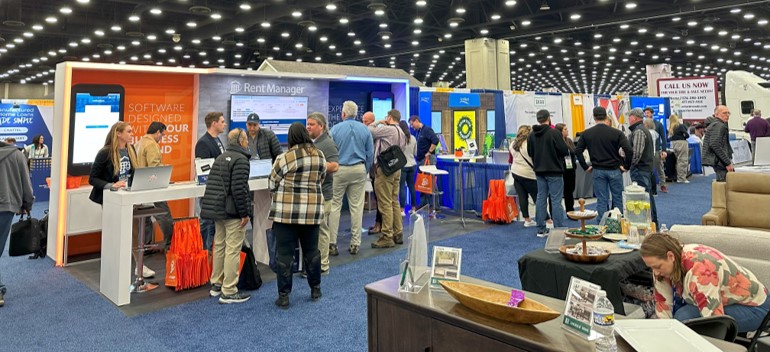The real estate sector inherently operates in a decentralized manner, with businesses spread across various locations, sometimes spanning the country. However, due to macroeconomic trends and changes in the labor force, even the few centralized back-office functions like accounts payable (AP) are becoming decentralized.
Property management businesses can effectively overcome the challenges of decentralization by incorporating appropriate digital tools. Implementing centralized automation technologies can enhance efficiencies and visibility.
As real estate companies cope with industry trends like increased demand for rentals, hybrid work, and the digital skills gap, adopting centralized technology will be essential to keeping finance processes running smoothly.
Increased Need for Rental Property Management
Residential real estate demand is shrinking as home mortgage rates hover near 7%. According to the Mortgage Bankers Association, mortgage application volume hit a 28-year low in March as a result.
The 2021 American Housing Survey conducted by the U.S. Census Bureau revealed that approximately one-third of Americans rent their homes—a number that has been steadily increasing for nearly six decades and is expected to continue growing.
Consequently, there is a great demand for property managers. Organizations in the property management sector should prepare for a surge in business in the near future, particularly as economic uncertainty persists and inflation reaches a 40-year high. To efficiently handle this increased workload, real estate finance teams must adopt automated processes to streamline workflows and ensure distributed teams can collaborate effectively.
Adjusting to Hybrid
AvidXchange conducted a survey of 500 finance professionals from various industries in 2022. The results revealed that 30% of respondents intended to downsize or completely eliminate their office space in 2023 to cut costs and brace for a potential recession. The results also indicated that 44% of the participants’ companies had already reduced or eliminated office space because of the COVID-19 pandemic.
AvidXchange’s 2023 AP Career Satisfaction Survey found that most finance employees are working in hybrid (42%) or fully remote (19%) environments. This isn’t surprising, since the International Workplace Group recently reported that companies save $11,000 per year per hybrid employee.
Hybrid work brings advantages not only to businesses, but also to employees. In a survey conducted by the World Economic Forum, 68% of global employees expressed a preference for hybrid work arrangements because of benefits like commute-related savings (both time and money), improved work-life balance, and flexible working hours. A mere 8% of employees said they prefer to work exclusively in-person at the office.
As workplaces continue to adapt to hybrid work arrangements, employers must invest in technology so employees can maintain the same level of productivity and collaboration they experience with in-person work. Digitizing aspects of work processes and communication is imperative. This is especially true in the finance department where paper-based processes may stall when employees are away from the office.
The preference for hybrid work will continue, decentralizing teams across organizations. Tech tools are the key to keeping processes centralized, connected, and efficient.
Finding Talent and Building Digital Skills
As of June 2023, the unemployment rate in the real estate sector stands at a remarkably low 0.8%. Although this may appear positive, it poses a significant challenge for businesses seeking to hire individuals with specific skill sets that are scarce in the job market. According to the National Center for the Middle Market (NCMM), 23% of middle market companies are struggling with an “insufficient” workforce that doesn’t meet current market demands.
Moreover, the current workforce lacks the essential technology skills required to thrive in a digitized workplace. The Commercial Real Estate Development Association reported that the rate of digital transformation within the real estate industry is outpacing the growth of technical talent, creating what is commonly known as the “digital skills gap.”
To address the shortage of qualified talent, the NCMM discovered that 37% of companies are planning to revamp their employee training programs within the next 6-12 months. Many of them are focusing on “upskilling” initiatives designed to provide technical training for their existing employees. Interestingly, a recent Gallup poll revealed that 69% of business and financial staff members are interested in upskilling opportunities. These programs offer businesses an affordable means to retain employees, attract new talent, and bridge the digital skills gaps within their organizations.
Gartner predicts that technology will reshape 40% of finance roles by 2025. Hence, it’s imperative to foster digital skills within your team and enable them to effectively utilize the tech tools required by a decentralized work model.
Automation Offers a Solution: Centralized AP
Embracing technology can aid your organization in adjusting to the changing industry landscape. Automation tools play a crucial role in enhancing efficiency, particularly within finance departments. By incorporating automation software that seamlessly integrates with your current accounting system, your organization can enjoy numerous advantages.
1. Unify Processes
Centralizing processes is key in a decentralized hybrid work environment. Thanks to AP automation software, finance departments gain 24/7 visibility into invoice approvals and payments, with the ability to access systems from anywhere, at any time. The days of needing an employee to be physically present in the office to handle bill payments are no more.
2. Scale with Automation
In the current labor market, finding qualified talent can prove to be a daunting task. However, with automation, your finance team can accomplish more without the need to add headcount. By entrusting technology with menial tasks, your team can redirect their efforts toward more strategic and impactful work.
3. Improve Employee Sentiment
Given the competitive job market, retaining existing employees is essential for real estate businesses. According to the AvidXchange 2023 AP Career Satisfaction Survey, employees experience a greater sense of connection and support when their organization makes investments in tools that enhance job efficiency. This effect is particularly pronounced when technology investments are complemented by upskilling opportunities.
Taking Advantage of No-Cost AvidPay
Rent Manager users have access to a no-cost solution that helps streamline and create centralized AP work. No-Cost AvidPay is a built-in Rent Manager solution that automates payments.
With No-Cost AvidPay, your AP team can eliminate inefficient payment processes and more-easily pay bills. You no longer have to worry about paperwork, stamps or dropping off payments at the post office. Since No-Cost AvidPay is built into Rent Manager, you won’t have to waste time switching in and out of several different software programs—the resource is available within a single-screen dashboard.
In addition to time savings, we estimate real estate companies can save an average of $4,000-$6,000 on payment processing each year with No-Cost AvidPay for Rent Manager. And since the solution is built into Rent Manager, users will be able to hit the ground running in a familiar platform.
As property management companies navigate a “new normal,” solutions like No-Cost AvidPay will help AP teams work more efficiently. The integration of centralized technology in conjunction with digital-skills training will empower businesses to effectively cope with a decentralized work model, thereby optimizing productivity and positively influencing the bottom line.
Learn more about No-Cost AvidPay for Rent Manager or schedule a demo here.






